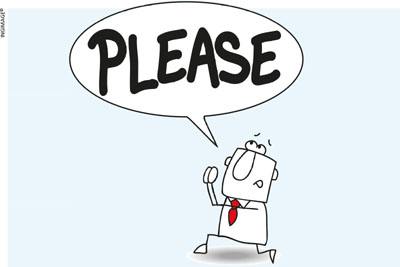RELATIONSHIP HACKS
MAKING FAVOURS EASY TO ASK
Pallavi Pinakin presents a guide on how to ask and return favours graciously
 Many people are reluctant to ask their coworkers for help because they think it might make them seem annoying or unlikeable. While this may be true if you seek favours incessantly, it’s definitely not the case for those who ask for occasional assistance.
Many people are reluctant to ask their coworkers for help because they think it might make them seem annoying or unlikeable. While this may be true if you seek favours incessantly, it’s definitely not the case for those who ask for occasional assistance.
The reality is that we all need help sometimes because we may be overwhelmed by work, as a result of dealing with a tough personal situation
or coping with the need to expand our network to achieve professional goals.
So here’s an open secret of sorts – actually, most people like doing things for others!
If and when you ask someone a favour, you give that person a chance to help you and feel good about themselves. Giving is more fulfilling than receiving so it’s helpful to think of a favour as a two-way transaction or opportunity.
In addition, it could establish a useful give-and-take relationship for the longer term. Your coworker lends you a hand now, you go the extra mile when he or she needs help in the future, and the favour is returned. There’s also the fact that asking favours makes you more (rather than less) likeable.
Have you heard of the ‘Ben Franklin effect’?
The story goes that American inventor and politician Benjamin Franklin once wanted to win over a rival legislator. To accomplish this, he asked the person if he could borrow a rare book from his library. Flattered, the man agreed and Franklin thanked him for it sincerely. Following this incident, the legislator began conversing regularly with Franklin – and the two of them went on to become lifelong friends.
The reasoning behind the Ben Franklin effect is as follows: when you ask someone a favour in the right way, he or she can sense that you’re reaching out and feels motivated to reciprocate that feeling. As a result, that person will end up liking you more – and your relationship is thereby strengthened.
Other researchers believe that this outcome is due to cognitive dissonance where when people do you a favour, it’s difficult for them to reconcile themselves to disliking you. So they convince themselves that they actually like you.
Whatever the reason may be, the Ben Franklin effect is undeniable. Favour seekers don’t need to worry about losing their likeability if they make an effort to ask for help in a gracious yet effective manner.
So here are some tips to follow when requesting favours from coworkers.
START RIGHT Pick the right time to ask your coworker for a favour. For example, if he or she is buried under a heavy workload or leaving for a holiday the next day, it would be thoughtless to ask for help.
It’s also important to set the stage. Don’t launch into your request straightaway – because this gives the impression that you’re taking the other person’s cooperation for granted.
Instead, give that person a chance to switch to the right mindset by saying something like ‘I have a favour to ask you.’ This way, you acknowledge that your request is in fact a favour, and that you value your colleague’s time.
OFFER A REASON When you make your request, be sure to explain the reason for it – after all, people like to know why they’re being asked to do something.
‘Because’ is a powerful word that tends to elicit a positive response. So whether you’re asking a coworker to cover your shift or pitch in with a project, it’s important to tell them why. Be straightforward and genuine. Don’t beat around the bush or offer dramatic explanations as these are likely to be poorly received.
OFFER AN ESCAPE In case you’re asking a big favour, give the other person a chance to decline – for example, ‘I totally understand if you can’t; I know it’s a busy time for everyone.’ Without this escape hatch, the request can feel more like a command or an obligation.
By allowing your colleague to make a conscious choice, you give the Ben Franklin effect a chance to come into play. When the person responding to a favour feels good about helping out, he or she is more predisposed to like the seeker. But if the giver feels he or she is being forced to comply with your request, you will probably be resented for it.
FOLLOW UP The biggest mistake people make is forgetting to follow up and saying ‘thank you.’ After receiving the favour, reach out and express your appreciation, and update your colleague regarding the outcome. You could do this over the phone, through an email or a ‘thank you’ note.
For instance, if you asked someone to introduce you to a potential client, let him or her know whether you managed to secure the business. If a coworker helped you with a presentation, tell him or her how it was received.
In other words, don’t leave the person hanging. If you fail to close the loop, your coworkers will think twice before helping you again.





Leave a comment